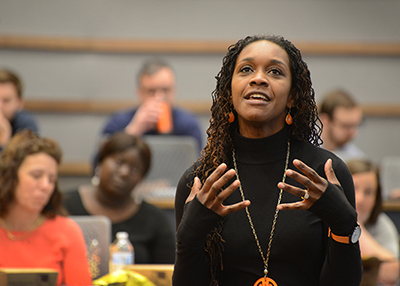Race, gender and rising above stereotypes
Monday, March 9, 2020
No person is just a teacher or just a mother or just an African American or just any other descriptor. We are all a combination of identities that collectively make up how we see ourselves and how society perceives us. And it only gets more interesting when looking at where all of a person’s various identities meet.
For Dr. Alexis Smith Washington, that intersection of identities and how they play out in our lives is a central theme of her research as a faculty member at the Spears School of Business. Washington, an associate professor of management, examines the intricacies of the intersectionality of identity, especially when it comes to race, gender and inclusiveness in the workplace and their influence on opportunities and limitations.
In December 2019, Washington was recognized by Oklahoma State University with the Distinguished Early Career Faculty Award given to a professor who has earned tenure in the last three years and shows potential for continued contributions to the university in instruction, research and creative activity. Her research focuses on race, gender and bias in the workplace.

“A common thread that I weave through my research is how our identities come together to inform what we think is possible and the heights that we believe we can reach,” Washington said. “But identity is only a starting point. It’s not the whole story. First, we have to understand our constraints in society, hence bias and discrimination research, but we also have to understand our potential.”
A native of New York City, Washington has been keenly aware of and interested in her own intersecting identities – scholar, African American woman of Caribbean descent, wife, mother – that give her a unique perspective on the workplace and pushes her to ask people how their identities inform what they work towards and what they ultimately achieve.
In 2019, Washington and co-authors published research examining the career experiences of 59 black female executives based on in-depth interviews over a seven-year period. In their Academy of Management Journal article, the researchers describe the concept of intersectional invisibility that these high-performing women often experienced in which they found themselves overlooked and disregarded because they weren’t typical of either their race or gender.
“Black women are not merely black or women, they are black women, which is a unique status from either of their individual identity groups and opens them up to different experiences, both negative and positive,” Washington said.
The paradox of being invisible as female executives meant that many of those in the study said they experienced a freedom from negative gender and race stereotypes, allowing them to “decide what path they want to walk down and how to craft the image they present at work setting the tone for how they were going to be treated,” Washington said. “That was such a powerful, uplifting part of intersectionality.”
But Washington and her collaborators also found that a paradox of invisibility is that as black female leaders, their research subjects were also hyper visible because of their unique identity in the corporate workplace, where only approximately 1.3 percent of senior management and executives in U.S. companies are African American women, according to the study.
“They existed in both these worlds simultaneously and had to learn how to walk that fine line and manage that tension,” Washington said.
As part of the study, the authors looked at the tools their cohort of black female executives reported using to foster their careers and reach high levels of success. Chief among these was developing strong relationships with mentors, peers and subordinates. These executives were very good at consciously crafting relationships that overcame intersectional invisibility, according to Washington.
Further studying concepts of identity in the working world, Washington presented research last year at the annual meeting of the Academy of Management on parental guilt and its effect on work productivity. The study is close to Washington’s heart who, like most parents, must balance the demands of career and parenting, in her case helping raise a 10-year-old daughter and two toddling sons with her husband.
“The thrust of the paper is when does something that feels negative, like guilt or shame, actually become a powerful motivator,” Washington said. “Does shame about not being at every field trip or making every meeting drive you to be a better parent, a better employee? Does it drive you to work smarter, be more productive?”
And yes, Washington saw herself reflected in the research, something that wouldn’t have been the case only a decade before when “parent” wasn’t one of her identities.
“I’m more than just my race, just my gender. I’m a bunch of other things,” Washington said. “Parenthood meant nothing to me until I had my first child, then it meant a whole lot. Identities mean different things to us at different times and in different contexts.”
MEDIA CONTACT: Terry Tush | Marketing and Communications director at Spears School of Business | 405-744-2703 | terry.tush@okstate.edu
